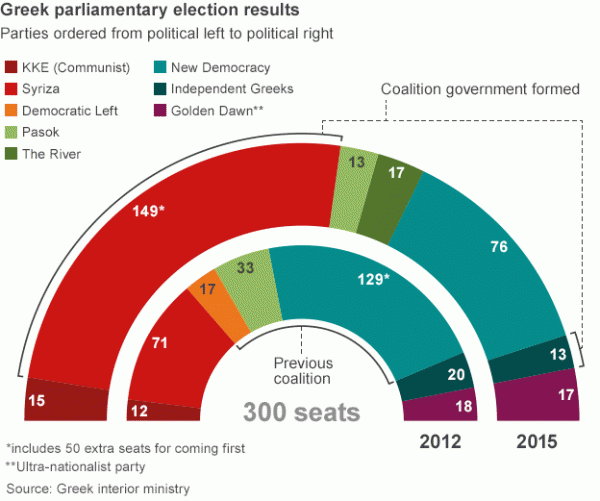Left parties fail to form government – Syriza goes into coalition with populist right Independent Greeks
Interview with Andros Payiatsos from Xekinima (CWI Greece)
What is the importance of the Greek election results?
We can describe the result as of historical significance because it represented the collapse of the old forces that ruled the Greek political scene for decades. Also the rise of a new left formation, Syriza, which shot up from 4-5% in 2010 to 36.5% now on the basis of a left, pro-working class programme.
This is despite a mass fear campaign launched by the ruling class in Greece which threatened that this would mean the collapse of the country, exit from the Euro etc. All of this had no effect, or a very limited one, on the masses who voted for Syriza, particularly in the working class areas in the big cities where Syriza came close to an absolute majority.
Pasok (the traditional social democracy party) has been reduced to just over 5% – down to nearly one third of what they got in 1974 when first created – below neo-fascist Golden Dawn. They are split because Papandreou (ex Pasok prime minister) has declared a new party in an attempt to distance himself from the collapse of Pasok. This new party, Movement for Democratic Socialism, was not able to enter parliament because it got 2.5% and needed 3%.
In Greece there has been a total collapse of 27% of the GDP – worse than the occupation by the Nazis in the Second World War, from the point of view of economic collapse. There is a mass poverty – official estimates say 6.3 million out of 11 million are around or below the poverty line which is only around 450 euros a month. Unemployment stands at 26-27%, youth unemployment around 55%. Around 100,000 youth have left the country. There are elements of a social collapse and mass impoverishment of society. This is the conditions under which the Syriza government is called to find solutions to these problems.
Syriza announced a coalition with Independent Greeks party. Why was Syriza not able to reach an agreement with the Communist Party (KKE)?
Syriza appealed to the Greek communist party (KKE) to form a government of the left parties. KKE refused – this is an outcome of the general sectarianism and isolationism of the communist party who use the fact that there are differences on the ideological and political plane to say no to any kind of collaboration with any force of the left in Greece. This is a general policy, not just in relation to the specific circumstances with Syriza.
They said they wouldn’t even give a vote of confidence to a Syriza government. The KKE claims to be very proud because it increased its vote by 1% compared to June 2012 which is about 50,000 votes. This is ridiculous because they got 5.5% now and 4.5% then, yet back in 1981 the KKE had 11%. This is the most devastating crisis of Greek society in decades and they are very proud to have received 5.5% – it’s scandalous!
So this allowed the Syriza leadership to go into an alliance with ‘Independent Greeks’ to form a new coalition government. It is fair to say that a section of the leadership, the more right wing, were always in favour of a coalition government with the Independent Greeks, although they never publicly stated so, to use them as an alibi to avoid the implementation of socialist policies naturally demanded by the rank and file and by the working class.
The Independent Greeks began as a populist split from New Democracy (traditional right wing party) in 2012 when Samaras (previous New Democracy prime minister) performed a summersault, from proclaiming to be against the memorandum, to signing up to a new memorandum the first minute he was in government, and agreeing with the Troika to implement severe austerity policies. The Independent Greeks come from the right wing. They have no relationship to the working class or left policies. They support the market and the capitalist system. They don’t call for exit from the EU or the Eurozone but they are against the memorandum and austerity. They have a mild nationalistic (they describe it as “patriotic”) character. They don’t stand against the EU and the Eurozone but they might be willing to go along with such a policy if it comes to a serious clash with the Troika.
It’s a force that cannot provide any sort of sustainability for coalition with Syriza. It means that the new coalition government will be an unstable formation because it bases itself on forces that represent opposite camps.

The reaction internationally of the left and workers to the Syriza victory has been very enthusiastic – what’s it been like in Greece?
The rise of Syriza has been treated with mass enthusiasm internationally and seems to be acting as a catalyst in relation to formations of the left and for social movements to go on the counter-offensive. The potential is definitely there for this.
In Greece it’s not the same. The best way to describe the situation for the mass of workers and youth is that they heaved a huge sigh of relief at the election results but there is no wild jubilation. Syriza has put “too much water in its wine” to use a Greek expression – i.e. watered down its programme too much, particularly in the recent period. The “programme” has become extremely blurred and unclear.
Workers believe things cannot be as be as bad as before – they had a strong feeling that they had to put an end to these barbaric attacks by the government and Troika so they voted Syriza en-masse. But they are very doubtful about what the next day will bring. This was reflected by the fact that the central Athens celebrations on election night attracted about 5,000 people – not even half the membership of Syriza in Athens. Workers feel very restrained and some are even sceptical about the Syriza victory but they are very pleased that they punished PASOK and New Democracy, the main Troikan parties.
Golden Dawn (GD) managed to hold up its vote, despite a clampdown by the State, including imprisonment of many of its leaders. Should it be of concern to the left that GD could use the next period to try to rebuild?
It should be of very serious concern for the left. Despite all mass parties of the left tending to underestimate the dangers of neo-fascism, Golden Dawn has shown that it has a quite significant very hard core of voters of hundreds of thousands. It is an openly Nazi organisation now, and clearly murderous. Despite this it was able to maintain a similar vote to 2012. This means that the danger of neo-fascism will come back to the fore again in the future, particularly if a Syriza-led government is seen to fail working people and the middle classes, and the left has to be prepared for this.
During the election campaign, Xekinima (CWI Greece) was not able to come to an agreement with Syriza about standing candidates, but Xekinima had a campaign during the election. How did that go?
We had a very good campaign, particularly taking into consideration that there were only 11 days of campaigning. This was because of the conditions under which the elections took place – they were announced suddenly by the outgoing government and then it took Syriza and all the other parties more than two weeks to decide the candidates’ lists. The Syriza leadership would not agree to the candidates we proposed standing on local Syriza lists because they knew we would have MPs elected and that they would have been a pole of left opposition inside and outside Syriza.
Nevertheless the CWI in Greece, Xekinima, came out very well from the election despite Syriza’s refusal to agree to our comrades standing as part of its lists. This setback was quickly overcome because the Xekinima comrades understood that what was necessary for society and the working class was a victory for Syriza in these elections. We had a very powerful campaign; we distributed nearly 9,000 leaflets daily and we sold nearly 250 papers, each day. So this brought us into contact with many people. We are planning open branch meetings in the various neighbourhoods in the next weeks because it wasn’t possible to hold them during the election campaign.
What do you think will happen in talks between the new Greek coalition government and the Troika and, in particular, Chancellor Merkel’s government in Germany? It’s speculated that Markel could take a hard line and, despite Tsipras’ wishes, this could lead to a Greek default. But there is also speculation that under pressure to keep the eurozone intact, the Troika and Merkel will attempt to renegotiate the debt with Greece, not to get rid of it, but to reschedule repayment.
This is a crucial question. It’s clear that both sides want to negotiate and come to a compromise. The Syriza leadership clearly wants a compromise. Merkel seems to be ready for some kind of a compromise. Otherwise they know this could cause a chain reaction and a major crisis in the eurozone. But the question is if they can come to a compromise.
Merkel would be ready, I would assume, to grant some concessions. They would probably be ready to grant an extension to the repayment of the debt, which would mean some lessening of the burden of the budget in Greece on an annual basis.
But, on the other hand, in relation to the Greek working class, Syriza will have to concede, as a minimum, a number of demands, such as the following: the minimum wage back to the pre-crisis levels; social benefits to the completely downtrodden layers of society who are not able to survive or meet their daily needs, like being able to afford food and electricity etc. They have to aim to reinstate labour relations which have been completely deregulated. They have to put an end to the conditions of slave labour which are frequent practice in the private sector – where workers are forced to work up to 12 hours a day, seven days a week without even overtime pay. They have to get rid of the goldmines in Halkidiki, in northern Greece, which is a huge environmental issue. They have to reinstate workers to their jobs at ERT, the national broadcaster etc.
These are things that Syriza cannot avoid being seen to try doing – that are considered by society, by Syriza voters and by Syriza’s left rank and file, as basic and immediate! If Syriza doesn’t deliver these in the very first period of its government, it will immediately mean a major crisis inside Syriza. So, Syriza will be forced to move in the direction of carrying out these measures.
But if you look at these measures, which could be described as basic to resolve the humanitarian crisis today in Greece, they actually tear apart the programme applied by the Troika over the last four years.
The question thus is, would the German ruling class be willing to make this kind of compromise to the Greek coalition government? This is doubtful, to say the very least. Therefore, while there can be no certainty about what the balance of forces will be, after these Greek/Troika negotiations, I believe that the issue of the default will come back forcefully on the table.
We say that if Greece defaults and finds itself out of the euro-zone, a left government should immediately introduce capital and credit controls and state monopolisation of foreign trade, as part of a wide programme that needs to be introduced today anyway, of emergency measures, including nationalization of the banks and the commanding heights of the economy, workers’ control and management, planning of the economy etc, to deal with the crisis and to safeguard workers’ rights and living conditions and for fundamental socialist change.
What role will Xekinima play in the next period?
The leadership of Syriza will use the Independent Greeks as an alibi for not applying the necessary left, pro-working class, socialist policies. So we have to demand that a consistent pro-working class programme is applied. If this means a crisis in the government and early elections then this is how it should be.
The main role that we can play, together with other forces of the left, including inside and outside the ‘Initiative of the 1000’, is to campaign for pro-worker and socialist policies in collaboration with big sections of the left rank and file of Syriza.
This is particularly the case through the rank and file movements. I think that a major effect of this government on society, in the first instance, will be to provide a breathing space for the working class and the social movements and then a counter-offensive – in other words, workers will mobilise to demand to take back what they have lost over the past years.
In this situation, the Syriza government could shift to the left and even to carry out policies which are far beyond what the Syriza leadership now envisages.
Our main task is to do all we can to help build and strengthen the power and independent action of the working class. This will be determined by the character of the class struggle in the next period.
The only solution to the crisis is the application of socialist policies and a socialist programme. Any government which doesn’t provide these policies will end up in crisis.
So, for example, we call for Syriza to enact debt repudiation, to introduce a living wage and living pension, massive investment in welfare, health and education. A socialist programme also entails taking the big corporations into public ownership, under democratic working class control and management, for the benefit of the majority.
The hugely positive reaction around the world to the election of Syriza shows how the Greek working class has millions of allies amongst the European and global working class. A socialist programme pursued by a left government would find an even more powerful echo across Europe and working people everywhere would emulate the Greek workers. It would pose the need to struggle for a socialist confederation of Europe, on a free and equal basis.





